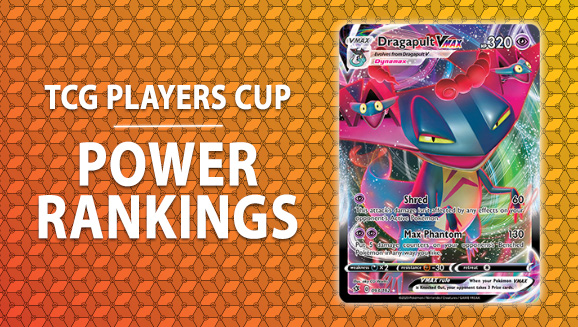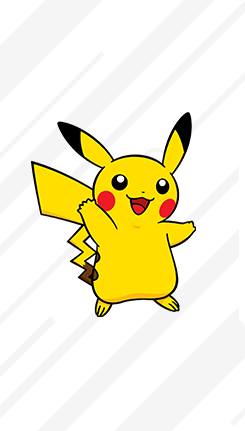Our Power Rankings experts weigh in on the most compelling competitive decks ahead of the Region Qualifiers.
For three straight Fridays on July 17, 24, and 31, fans can watch incredible Pokémon TCG action from the Players Cup Region Qualifiers on Twitch.tv/Pokemon or YouTube.com/Pokemon. Hundreds of players will compete, but only 15 players will advance to the Players Cup finals in August.
We’ve called upon our Power Rankings Panel to take a look at the top current Pokémon TCG decks in the field. Our expert panelists are as excited to see real competitive matches as you are, and they’re eager to share which decks they think have the best shot of finding success in these thrilling matches. Read on to see what decks and strategies you should be looking for when watching the Pokémon TCG Players Cup Region Qualifiers!

Dragapult VMAX is a new archetype emerging from the Sword & Shield—Rebel Clash expansion, but it’s already the deck to watch out for. Tord Reklev, who knows a thing or two about this deck, won the Players Cup Kickoff Invitational with it, and there’s no doubt that many competitors will be inspired by his success.
The theme of Dragapult VMAX is spreading damage around on the opponent’s board, which can result in multiple Prize cards from Knocking Out Benched Pokémon—it’s not unusual to take five Prize cards on the same turn with the star Pokémon’s Max Phantom attack!
There are many ways to build upon this core idea. Some players include Crushing Hammer to slow down the opponent, others add Mr. Mime to prevent the opponent from using Scoop Up Net, and still others play Super Scoop Up to get a damaged Dragapult VMAX back in hand and deny their opponent a big Knock Out. But no matter the variant, Dragapult VMAX will be a major contender for the title.

Widely regarded as the best Pokémon V from the Sword & Shield expansion, Zacian V has been dominating the tournament scene for months. In the past, it was mostly paired with Arceus & Dialga & Palkia-GX, but the TAG TEAM lost some of its popularity with the launch of Sword & Shield—Rebel Clash.
Instead, a new variant with a similar concept emerged. It uses the combination of Oranguru and Mr. Mime to put Jirachi Prism Star into the Prize cards, thus reducing the number of attacks needed to win the game. With the help of Scoop Up Net, this combo can even be used multiple times in a single game!
Zacian V’s HP and damage output are already very impressive for a 2-Prize Pokémon, and being able to take extra Prize cards makes it even more threatening. I like the approach with Jirachi, but its other versions are also strong. Expect to see many different styles of Zacian decks in the Players Cup!

Pikachu & Zekrom-GX refuses to tap out—this TAG TEAM Pokémon-GX has been featured in nearly every Power Rankings piece so far. It’s difficult to argue against an archetype renowned for doing huge amounts of damage as early as the first attack of the game.
The addition of two cards from the Sword & Shield—Rebel Clash expansion provides the Pikachu & Zekrom-GX deck with enough power and pace to excel in the current metagame: Boltund V and Speed Lightning Energy.
Even though this archetype continues to encourage the same strategy, the execution may look a little different. Don’t be surprised to see competitors spread their Lightning Energy attachments across their board instead of committing them all to one or two TAG TEAM Pokémon-GX. By doing so, Boltund V can still do loads of damage with its Bolt Storm attack, even if one of your Pokémon is Knocked Out in the previous turn.
Pablo Meza demonstrated that the updated Pikachu & Zekrom-GX deck has merit when he placed third in the Players Cup Kickoff Invitational in June. Keep your eyes peeled for Lightning-type combos during the Players Cup Regional Qualifiers. If you blink, you might miss them.

Blacephalon has a key strength that none of the other decks on this list, or in the Standard format, possesses in quite the same way: nearly unlimited power potential. Blacephalon may not have the most consistent draw power, or the most complicated lines of play, but it has the ability to Knock Out anything, at any point, regardless of the board state.
As my Power Rankings partner Stéphane explained, playing Blacephalon is an exercise in proper sequencing of your plays and making every single card count. Just like any other deck, you are going to need some luck to go your way, and it’s ultimately up to you to put yourself in a position to get lucky. Between playing cards in the correct order, and realizing when overextending is necessary and by just how much, Blacephalon is the ultimate “easy to learn, difficult to master” deck in the format. Best of luck to everyone who has mastered the deck, as I think it’s a great choice for the Players Cup.

Bringing up the end of our Rankings, Spiritomb doesn’t look like much on the surface, but it can pack quite a punch. Damaging one’s own Pokémon isn’t intuitive, and 60 HP isn’t much to begin with—Spiritomb is the true glass cannon. This 1-Prize Pokémon’s power to trade with big 2- and 3-Prize Pokémon is what’s made it viable off and on for a while, but Scoop Up Net and other Sword & Shield—Rebel Clash additions have taken it to the next level.
We saw Ross Cawthon have a rough run with the deck in the Kickoff Invitational, but its strength is greater than those matches showed. One of the key attractions is the option to include a ton of different niche Pokémon—from Blacephalon-GX to get rid of that extra Prize card to Tapu Fini for dealing with your opponent’s Blacephalon (of all kinds) to Buzzwole for Pikachu & Zekrom-GX, the range has truly spanned the imagination.
The biggest problem for Spiritomb in the Players Cup is at the other end of this list: Dragapult VMAX is popular and a very uphill battle. It’s possible to take games—Weakness helps!—but it can be a very tall order.
Parting Shots
 Stéphane Ivanoff: The Players Cup is unique
among official TCG tournaments in that it uses a double-elimination system,
rather than a series of Swiss rounds followed by a top cut. This means that
players can only afford one loss in the tournament, unlike most Regional and
International Championships. I’m curious to see if this will change how players
choose their decks. I would expect most people to be conservative and opt for a
safe choice like Dragapult VMAX or Zacian V, decks that have a shot against
pretty much anything in the format...but at the same time, if the event is
centered around a small number of decks, those are exactly the right conditions
for a rogue deck to shine, if you can build one to beat these exact decks. Galarian Obstagoon, for example, could make a
comeback since the metagame is centered around Basic Pokémon, and its Darkness
typing helps against Dragapult VMAX.
Stéphane Ivanoff: The Players Cup is unique
among official TCG tournaments in that it uses a double-elimination system,
rather than a series of Swiss rounds followed by a top cut. This means that
players can only afford one loss in the tournament, unlike most Regional and
International Championships. I’m curious to see if this will change how players
choose their decks. I would expect most people to be conservative and opt for a
safe choice like Dragapult VMAX or Zacian V, decks that have a shot against
pretty much anything in the format...but at the same time, if the event is
centered around a small number of decks, those are exactly the right conditions
for a rogue deck to shine, if you can build one to beat these exact decks. Galarian Obstagoon, for example, could make a
comeback since the metagame is centered around Basic Pokémon, and its Darkness
typing helps against Dragapult VMAX.
 Robin Schulz: The
Players Cup being played through the Pokémon TCG Online brings one interesting
change for the stream specifically: Viewers can now watch the games from the
same perspective as the players. Seeing the cards in a player’s hand or deck as they look through it
makes it easier to follow and understand the decisions they take, so it’s an
ideal broadcast for anyone looking to improve their play. The current Standard
format, with five very evenly matched top decks, also provides great conditions
for some interesting gameplay, so I’m very much looking forward to watching
the Players Cup stream!
Robin Schulz: The
Players Cup being played through the Pokémon TCG Online brings one interesting
change for the stream specifically: Viewers can now watch the games from the
same perspective as the players. Seeing the cards in a player’s hand or deck as they look through it
makes it easier to follow and understand the decisions they take, so it’s an
ideal broadcast for anyone looking to improve their play. The current Standard
format, with five very evenly matched top decks, also provides great conditions
for some interesting gameplay, so I’m very much looking forward to watching
the Players Cup stream!
 Ellis Longhurst: Unlike in traditional tournaments, Trainers
compete in the Players Cup via the Pokémon TCG Online. The use of a digital
medium offers Pokémon fans a unique experience during the official broadcast—insight
into the play-by-play decision-making of the competitors. Every time a
competitor views their hand, their deck, or either player’s discard pile to
gain information, so does the viewer! Take note of which cards the competitors
hover over, what kind of information they seek, and how they use it to their
advantage. Evaluating the strengths and weaknesses of different lines of play
is one way to improve your in-game decision-making. Good decision-making is one
of the features that distinguish a top Trainer.
Ellis Longhurst: Unlike in traditional tournaments, Trainers
compete in the Players Cup via the Pokémon TCG Online. The use of a digital
medium offers Pokémon fans a unique experience during the official broadcast—insight
into the play-by-play decision-making of the competitors. Every time a
competitor views their hand, their deck, or either player’s discard pile to
gain information, so does the viewer! Take note of which cards the competitors
hover over, what kind of information they seek, and how they use it to their
advantage. Evaluating the strengths and weaknesses of different lines of play
is one way to improve your in-game decision-making. Good decision-making is one
of the features that distinguish a top Trainer.
 Kenny Wisdom: The Players Cup is one of the most exciting events in recent
memory. The happenings of this season are unprecedented, and although I know we
all wish we were heading to London for Worlds in just a few weeks, I think the
Players Cup will be a nice substitute until we can get back to Pokémon TCG
action at physical tables instead of virtual ones. The Players Cup is the first
event of its kind, and I for one am excited to watch history unfold.
Kenny Wisdom: The Players Cup is one of the most exciting events in recent
memory. The happenings of this season are unprecedented, and although I know we
all wish we were heading to London for Worlds in just a few weeks, I think the
Players Cup will be a nice substitute until we can get back to Pokémon TCG
action at physical tables instead of virtual ones. The Players Cup is the first
event of its kind, and I for one am excited to watch history unfold.
 Christopher Schemanske: The Players Cup is the first major double-elimination event in Pokémon
history, and that format presents its own challenges. In a Swiss tournament,
you can take losses in a few extremely rough matchups and still come out on
top. Here, it only takes two bad games to end your event. I’d stay away from decks
like Spiritomb, with clear bad matchups, for that reason. In my mind, look for
consistent decks with rounded matchups to come out on top. If there’s a deep
run from the losers’ bracket, I’d expect it to be a good player with a reliable
deck, rather than a deck playing the matchup spread.
Christopher Schemanske: The Players Cup is the first major double-elimination event in Pokémon
history, and that format presents its own challenges. In a Swiss tournament,
you can take losses in a few extremely rough matchups and still come out on
top. Here, it only takes two bad games to end your event. I’d stay away from decks
like Spiritomb, with clear bad matchups, for that reason. In my mind, look for
consistent decks with rounded matchups to come out on top. If there’s a deep
run from the losers’ bracket, I’d expect it to be a good player with a reliable
deck, rather than a deck playing the matchup spread.
About the Panel
Stéphane Ivanoff is a contributing writer for Pokemon.com. A longtime Pokémon fan, he has played the Pokémon TCG competitively since 2010 and is a former National Champion, seven-time Worlds competitor, and the 2018 and 2019 North America International Champion in the Masters Division. He studied mathematics and has a degree in probability and statistics, but he says that doesn’t help his game as much as you’d think! You can follow him on Twitter @lubyllule.
Ellis Longhurst is a contributing writer for Pokemon.com. She has been competing in high-level Pokémon TCG tournaments since 2006 and creating written content for the Pokémon community since 2011. Now she brings some Australian flavor to the Play! Pokémon commentary teams at the International and World Championships.
Christopher Schemanske is a contributing writer for Pokemon.com. He’s been playing the Pokémon TCG since 2010, with a streak of Worlds invitations between 2012–2018. Nowadays, he enjoys splitting his Pokémon time between playing and being part of the awesome Professor staff teams at major events.
Robin Schulz is a contributing writer for Pokemon.com. He has been competing in Pokémon tournaments for 10 years and was the Pokémon TCG Masters Division World Champion in 2018. He spends a lot of time traveling and competing, and he rarely misses a big event. Aside from playing Pokémon, he attends university, where he is studying mathematics.
Kenny Wisdom is a contributing writer for Pokemon.com. A longtime player of the Pokémon TCG, he claims to be the most prolific writer in the history of the game. These days you can find him on the desk as part of the commentary team covering Play! Pokémon events as well as on Twitter @kwisdumb. He’s also a Pokémon TCG streamer.

